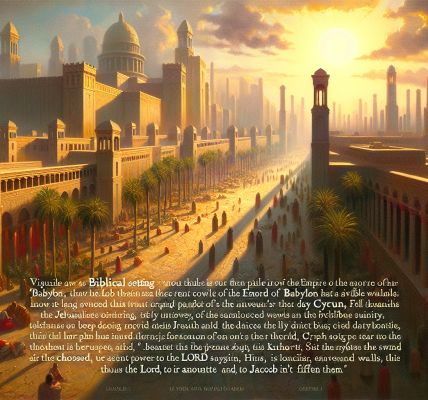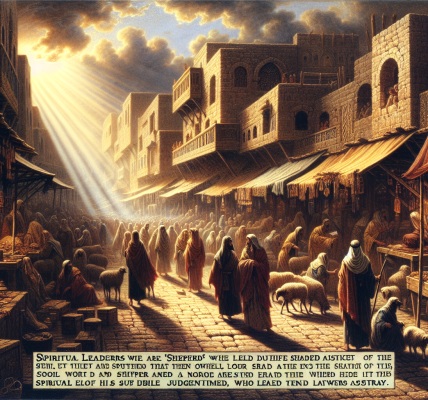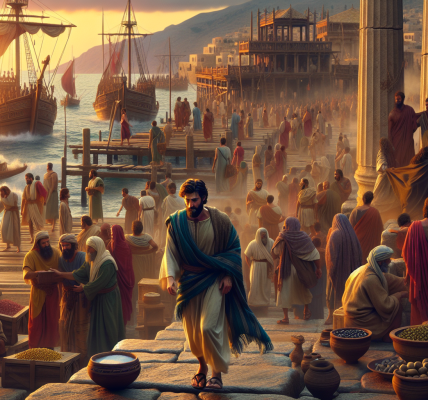**The River of Weeping: A Story of Exile and Longing**
The sun hung low over the horizon, casting long shadows across the banks of the rivers of Babylon. The once-mighty Israelites, now captives in a foreign land, sat in silence by the waters. Their harps, once played in joyful praise to the Lord, hung lifeless on the willow trees. The air was heavy with sorrow, and the sound of flowing water seemed to mock their tears.
It had been years since the Babylonians had razed Jerusalem to the ground. The Temple, the dwelling place of God’s glory, lay in ruins. The walls of the city, once a symbol of strength and protection, were now piles of rubble. The people of Judah had been torn from their homeland, marched across deserts and through foreign lands, and brought to this place—Babylon, the city of gold and idols, where the gods of stone and wood were worshipped, and where the name of Yahweh was but a whisper.
The captives sat by the river, their hearts heavy with grief. They had been forced to sing songs of Zion for their captors, who mocked them with cruel laughter. “Sing us one of the songs of Zion!” they demanded, their voices dripping with scorn. But how could they sing the Lord’s song in a foreign land? How could they lift their voices in praise when their hearts were broken, their spirits crushed?
One of the elders, a man named Eliab, leaned against a willow tree, his face streaked with tears. He clutched a small piece of parchment, a fragment of a psalm he had written in his youth. The words were faded, but they still burned in his memory: *”By the rivers of Babylon, there we sat down, yea, we wept, when we remembered Zion.”* He closed his eyes, and the memories flooded back—the Temple courts filled with worshippers, the sound of the Levites singing, the smell of incense rising to heaven. But now, all that remained was ash and dust.
A young woman named Miriam sat nearby, her harp resting in her lap. She plucked a single string, the note soft and mournful. “Why should we sing for them?” she whispered, her voice trembling. “Why should we give them joy when our hearts are filled with sorrow?”
Eliab turned to her, his eyes filled with both pain and resolve. “We do not sing for them, Miriam. We sing for the Lord. Even here, in this land of exile, He is with us. He has not forgotten us.”
But Miriam shook her head, her tears falling into the river. “How can He be with us? How can He allow this to happen? Our children ask us where Jerusalem is, and we have no answers. Our enemies mock us, and we have no defense. If the Lord is with us, why does He not deliver us?”
Eliab sighed, his heart aching for the young woman’s pain. He knew her questions were not born of doubt but of deep anguish. “The Lord’s ways are not our ways,” he said gently. “He has allowed this exile for a purpose, though we may not understand it. But He has promised to restore us, to bring us back to Zion. We must hold fast to that promise, even in the darkest of times.”
As the sun dipped below the horizon, the captives began to gather closer together. They shared what little food they had, their meager rations a stark reminder of their plight. But even in their suffering, they found solace in each other’s presence. They spoke of Jerusalem, of the Temple, of the promises of God. And though their voices were soft, their words were filled with hope.
One of the younger men, a Levite named Asher, stood and raised his hands. “Let us pray,” he said, his voice steady despite the tears in his eyes. “Let us cry out to the Lord, for He hears the cries of His people.”
The group bowed their heads, and Asher began to pray. “O Lord, God of Israel, You are holy and righteous. You are our refuge and our strength. Though we are in exile, though we sit by the rivers of Babylon and weep, we know that You are with us. Remember Jerusalem, O Lord. Remember Your people. Restore us, and bring us back to the land You promised to our fathers. Let not the songs of Zion be silenced forever.”
As the prayer ended, a deep silence fell over the group. The sound of the river seemed to fade, and for a moment, it was as if they were no longer in Babylon but back in Jerusalem, in the presence of the Lord. The weight of their sorrow lifted, if only for a moment, and they felt a glimmer of hope.
But then the sound of laughter broke the silence. A group of Babylonian soldiers approached, their armor gleaming in the fading light. “Sing for us!” one of them demanded, his voice harsh and mocking. “Sing one of your songs of Zion!”
The captives looked at each other, their hearts torn between defiance and despair. Miriam clutched her harp, her hands trembling. Eliab stood, his face filled with quiet strength. “We will not sing for you,” he said, his voice firm. “Our songs are for the Lord alone.”
The soldier sneered, his hand resting on the hilt of his sword. “Then you will suffer,” he said. “You will learn to obey.”
But Eliab did not flinch. “You may take our freedom,” he said, “but you cannot take our faith. The Lord is our God, and He will deliver us. Babylon will fall, and Jerusalem will rise again.”
The soldier laughed, but there was a flicker of unease in his eyes. He turned and walked away, his companions following behind. The captives watched them go, their hearts filled with a strange mixture of fear and hope.
As night fell, the group sat together by the river, their harps still hanging on the willow trees. They did not sing, but in their hearts, they whispered the words of the psalm: *”If I forget you, O Jerusalem, let my right hand forget its skill. Let my tongue cling to the roof of my mouth if I do not remember you, if I do not exalt Jerusalem above my chief joy.”*
And though they were far from home, though their hearts were heavy with sorrow, they knew that the Lord had not abandoned them. He was with them, even in exile, and He would bring them back to Zion. For His promises are sure, and His love endures forever.




